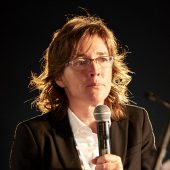
Keynote presentation: Seaweed applications, diversity, and challenges
Keynote presentation: Seaweed applications, diversity, and challenges
Dr. Pi Nyvall Collén, Scientific Director, Olmix Group, France

Keynote presentation: Seaweed applications, diversity, and challenges
Dr. Pi Nyvall Collén, Scientific Director, Olmix Group, France
About the speaker:
Pi Nyvall Collén, integrated the OLMIX group, a French company providing natural solutions for agriculture and agribusiness based on seaweed, clays and trace elements, in 2012 as R&D manager to coordinate research and development on the use of seaweed, from processing, production and stabilization of extracts and identification of the potential applications for plant, animal and human care applications. She was promoted to Scientific Director in 2018.
Pi has 30 years’ experience in research on seaweed, from genomics, biochemistry, enzymology and physiology. Her research have taken her to different parts of the world: a one year internship at University of California, Santa Cruz, USA, her PhD thesis in Plant Physiology at Stockholm University, Sweden, in collaboration with the Scottish Crop Research Institute, Dundée, UK, a Post-doctorate period at the University of São Paulo, Brazil, and from 2001 the Roscoff Biological Station in France. Her scientific production includes over 40 research articles, 8 patents and the co-tutoring of seven thesis students to date. She is corresponding member of the French Academy of Agriculture, member of the Board of EABA, and the advisory committee of SSC.
Company info:
A desire to provide natural alternatives to agricultural additives led to the creation of Olmix Group in Bréhan, at the heart of Brittany, in 1995. In 20 years, the company has become one of the major global specialists of seaweed-based products for agricultural applications. The company aims to accompany its clients in the agroecological transition.
Interview
1. When was the first time you got involved with seaweeds and why?
My first contact with seaweed was during my master project at Uppsala University and the extraction of alpha-1,4-glucan lyase from the red seaweed Gracilariopsis lemaneiformis. I continued with courses on molecular biology applied to seaweed and a thesis on starch metabolism of red seaweed.
2. What is your view on the European seaweed industry in 2030?
There are currently several positive actions on seaweed in the EU, for example the European Commission initiative of the EU for algae project and recent communication “towards a strong and sustainable EU algae sector”. In addition, the recent investment in seaweed cultivation by large non-profit organizations allowing to increase volumes of cultivated seaweed in Europe. All these actions participate to stimulate the seaweed industry for 2030.
3. What will you be talking about at Seagriculture EU 2023?
I will speak about applications of seaweed-based products and particularly on what they offer in agriculture.